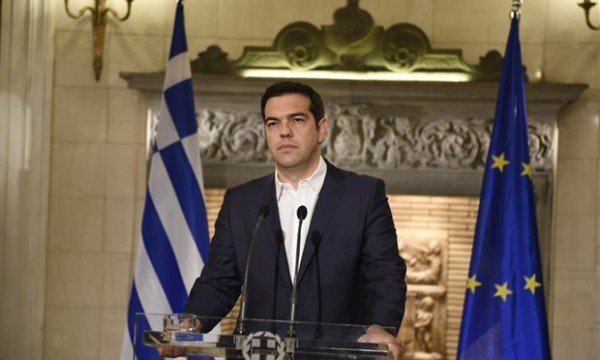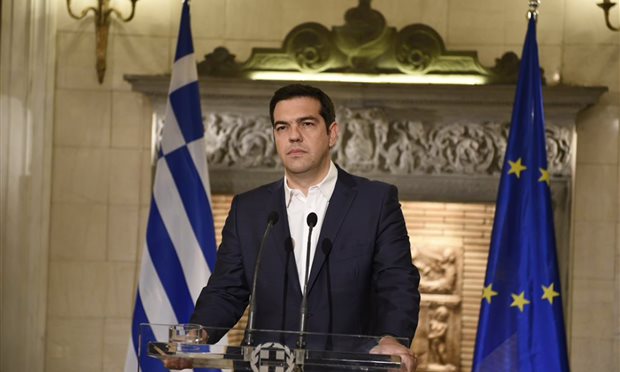Greek PM Alexis Tsipras has made a defiant speech as cash withdrawal limits begin to bite for bank customers.
Alexis Tsipras promised Greeks their pensions and wages would be safe.
Earlier the prime minister offered new concessions to eurozone partners, accepting most conditions that were on the table before talks collapsed.
Germany says talks requested by Greece will not be possible until after a debt referendum called by Alexis Tsipras for July 5.
In his address on July 1, Alexis Tsipras thanked Greeks for their “calm” in the face of bank closures and said their salaries and pensions would “not be lost”.
He angrily denied he had a secret plan to take Greece out of the euro, calling those who accused him of this “liars”.
Greek banks did not open this week after the ECB froze their liquidity lifeline.
Withdrawals from cash machines are capped at just €60 a day and long queues have been forming outside banks.
However, up to 1,000 branches re-opened on July 1 to allow pensioners – many of whom do not use bank cards – a one-off weekly withdrawal of up to €120.
Many pensioners had waited outside banks from before dawn, only to be told to return on Thursday or Friday, the Associated Press reported.
Some pensioners were told their pensions had not yet been deposited, AP said.
Close to 300 pensioners marched on the Bank of Greece in Athens after being given only a small sum from banks in the morning instead of the entire €120.
The letter sent to creditors by PM Alexis Tsipras says he was prepared to accept a deal put forward last weekend, if a few changes were agreed.
European markets surged on the news Greece might be willing to accept a deal.
However, German Chancellor Angela Merkel said no new bailout talks would be possible before Greece holds Sunday’s referendum.
As well as seeking further amendments to the creditors’ proposals, Alexis Tsipras’ latest offer is tied explicitly to agreement on a request for a third bailout lasting two years and amounting to €29.1 billion.
His application for a third bailout was accompanied by a request for debt restructuring that other eurozone countries would, at this stage, be unwilling to consider.
Two key meetings are to take place to discuss aid for Greece, after Athens missed the deadline for a €1.5 billion ($1.7 billion) payment to the IMF on June 30.
Eurozone finance ministers were set to discuss Greece’s new proposal in a conference call.
The second meeting will see officials with the European Central Bank (ECB) deciding on whether to demand more collateral from Greek banks on emergency loans it has given them.
With the previous eurozone bailout expired, Greece no longer has access to billions of euros in funds.
Only three other countries are still in arrears to the IMF – Sudan, Somalia and Zimbabwe. Between them, they owe €1.6 billion, only marginally more than Greece.
